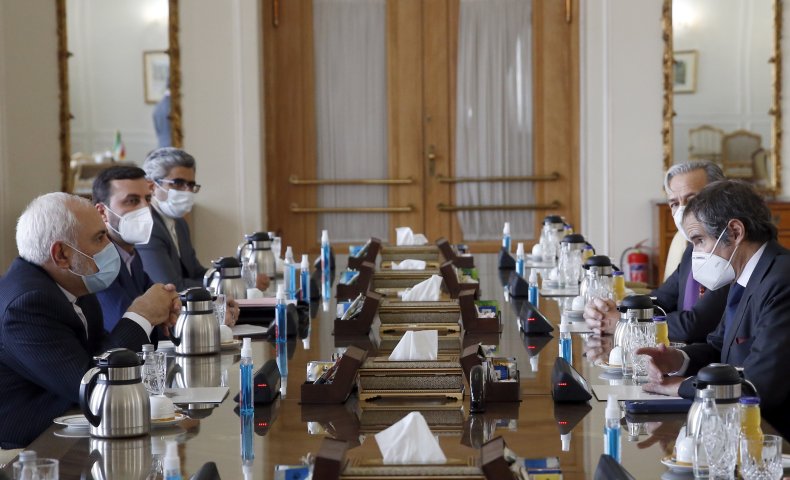[ad_1]
Iranian officials reached a deal with the International Atomic Energy Agency on Sunday to maintain inspectors’ access to the country’s nuclear facilities, heading off a crisis that could have scuppered hopes for talks to revive the Joint Comprehensive Plan of Action.
Tehran will go ahead with its threat to withdraw from the additional protocol—the agreement by which IAEA inspectors can visit its nuclear facilities. But the agency’s director general Rafael Grossi said on Sunday he had reached a “temporary bilateral technical understanding” to retain access for the next three months.
The number of inspectors allowed in the country will not change, but inspections will be more limited. Iran will also stop sharing video recorded by cameras at some nuclear facilities for the next three months.
If American sanctions are lifted in that time, the footage will be shared with the agency, said Iran’s envoy to the IAEA, Kazem Gharibabadi. If not, it will be destroyed.
The block on inspections is part of a package of measures passed by the country’s parliament in retaliation for the assassination—reportedly by Israeli operatives—of nuclear scientist Mohsen Fakhrizadeh. Lawmakers also ordered Iran’s atomic agency to ramp up enriched uranium production far beyond what was allowed under the JCPOA nuclear accord.
The measures are further hurdles for President Joe Biden to overcome as he tries to revive the JCPOA, a commitment made on the campaign trail despite opposition from conservatives and allies such as Israel.
For all his public support for the deal negotiated by Barack Obama, Biden has not rushed back into compliance. His administration is demanding that Iran scale back its nuclear program in line with JCPOA curbs before he lifts sanctions, which were imposed by Donald Trump after his withdrawal from the deal in 2018.
But Tehran says Trump’s actions make it incumbent on Biden to make the first move. Iranian leaders are refusing to wind down their nuclear program before full sanctions relief.
The government led by President Hassan Rouhani, a moderate who negotiated the JCPOA with Obama, has repeatedly said it is willing to return to the deal. But the conservative-dominated parliament is less convinced.
Even the IAEA deal appeared under threat from parliamentary maneuvring on Monday, prompting the Supreme Leader Ayatollah Khamenei to call for a resolution between lawmakers and Rouhani’s government.
Sunday’s IAEA deal offers a sliver of hope for JCPOA advocates if it survives parliamentary opposition. So does the U.S. State Department announcement last week that—having met with representatives from JCPOA signatories Germany, France and the U.K.—the U.S. is now ready for multilateral talks on how to revive the deal.
Even as a deal was being reached this weekend, Iranian leaders were sticking to their red lines, refusing to scale back nuclear activity and dismissing any suggestion that future talks would broaden the JCPOA to curb Tehran’s ballistic missile program and use of regional militias.
Biden and his top officials have said they want to use the agreement as a foundation for a “longer and stronger” deal. Conservatives argue that the current deal is inadequate in only addressing Iran’s nuclear program. Even then, they warn that its “sunset clause”—the expiration of restrictions in 2025—mean the accord is short-sighted.
Iran’s Assembly of Experts—the panel of clerics that picks the country’s next supreme leader—said on Monday the JCPOA was a “red line” that Tehran will not cross. The group also said that any return to the agreement without sanctions relief would be detrimental to the country, the Tasnim News Agency reported.
Foreign Ministry spokesperson Saeed Khatibzadeh told reporters on Monday that the IAEA deal was no concession to the U.S. “All the agreements made are within the framework of the law approved by the Iranian parliament,” Khatibzadeh said at his weekly press conference, according to the Mehr News Agency.
“The way to return to the deal is clear. They must first fulfil their obligations under JCPOA, and then they must remove those traps, i.e. sanctions,” Khatibzadeh added.
Foreign Minister Javad Zarif told the state-run Press TV on Sunday that for all President Biden’s talk of a diplomatic thaw with Iran, nothing has changed since he took office. “Biden claims that Trump’s policy of maximum pressure was maximum failure,” Zarif said. “But for all practical purposes, they are pursuing the same policy.”
Zarif said the Iranian’s parliament’s “remedial measures” were not a violation of the JCPOA. These steps, he said, would be reversed if Biden and the U.S. fulfilled their commitments under the accord.
“As the offending side, US must take corrective measures,” Zarif wrote on Twitter on Sunday. “Commit to JCPOA…effectively fulfil obligations,” he added.

STR/AFP via Getty Images/Getty
[ad_2]
Source link